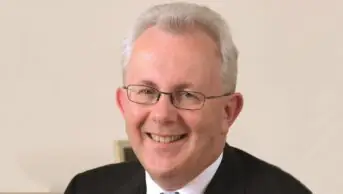Twice Royal Pharmaceutical Society of Great Britain (RPSGB) president Nicholas Wood opines in a recent letter that representing the interests of pharmacists is now done by others in pharmacy, and as such our Society, which was saved during his tenure two decades ago from becoming an organisation purely for the public benefit, should now, in his view, instead become a royal college primarily serving the public.
Contrariwise, there now exists already a pharmacy body in the form of the General Pharmaceutical Council, which was created when government forced the split away of regulatory functions from the RPSGB in 2010, with the specific intention that it would serve the public. This left the Society to dedicate itself as the one sole body representing the professional interests of all pharmacists in Great Britain, as it is bound to do under its current Royal Charter — which the special resolution vote (SRV) seeks to abrogate.
The draft charter being foisted upon us for our vote proposes changes which go radically further even than the one repelled at great effort in 2004: not only to re-write large swathes of its content — as can be seen manifest in the tracked changes version of the proposed charter — deleting all mention of pharmacists except in regard to existing full membership and to charitable relief, but also to change the fundamental nature of the body into one bound strictly by the requirements of charities legislation and regulation for charitable purposes only for the public benefit. As such, the Royal College of Pharmacy would not represent the interests of pharmacists.
Unlike previous SRVs — most recently in 2011 to admit “pharmaceutical scientists”, during which the Society website hosted a 70-page forum debating it — this draft charter, comprising the tangible proposal for scrutiny, was published only four weeks before this precipitate ballot opens. Since that time, the only opportunity for member engagement has been just two one-hour webinars.
In the webinars, concerns were dismissed with platitudes in the scant time available. Attendees asked for publication of the Firetail report, based on the content of which we are told Assembly made its decision to hold this SRV — it seems this is not to see the light of day.
Also asserted baselessly has been that the public benefit should align with the interests of pharmacists. But what will be the “public benefit” in practice? It might be interpreted to mean embracing the self-selection of P-medicines under its new jargon of “facilitated self-selection” and “safe supply”, under the guise of customer (not patient) choice and self-care — which would be neither in the interests of pharmacists attempting with heightened difficulties to supervise and often to refuse unsafe sales, nor of the health of patients and the public determined to purchase particular medicines.
It might mean removing the safety-critical pharmacist clinical check and even presence in the pharmacy, under the guise of savings for the public purse or of freeing up pharmacists to perform sundry services, which may not require the unique skills of pharmacists and might then be delivered by other healthcare professionals or even support staff. It might mean pharmacies expanding services ever further, and perhaps even employing prescribing pharmacists cheaply to save GP costs, for the perceived benefit of the public increasingly unable to get a GP appointment, but heightening the immense workload pressures which have long been inflicted upon pharmacists facing patients at the front line, which imperil patient care and safety. And it might mean pharmacist education tailored to suit those ends.
The “public benefit” may very well transpire to mean just what the Board of Trustees chooses it to mean — neither more nor less.
David Tyas, MPharm (Hons), MTPharmC, MRPharmS
Response from the Royal Pharmaceutical Society:
The proposed Royal College of Pharmacy will always be profession led, with members holding the majority of roles throughout the proposed governance leadership structure. This includes the Board of Trustees and the Senate, meaning that pharmacists will remain as the ultimate decision-makers as well as developing the strategy for the new royal college.
I enjoyed meeting and speaking with many members and non-members in October and November 2024, as we travelled the length and breadth of Great Britain to set out and seek feedback on our draft proposals (we also hosted similar online events). We had a rich set of conversations with members and non-members that helped us to shape and finesse our final proposals. If you were not able to attend, do take a look at our roadshow report.
In terms of public benefit, our mission to become the world leader in the safe and effective use of medicines inherently serves both the public and pharmacists. Public benefit is not just a slogan; it is the driving force behind our commitment to patient safety, innovation and professional excellence — I doubt there is a pharmacist out there who does not consider the needs of their patients and the public their first concern.
Transforming the RPS into a royal college dedicated to public benefit does not diminish its role in championing pharmacists. Instead, it strengthens and deepens our position as a professional leadership body, which in turn benefits other organisations in the pharmacy eco-system, including other professional leadership bodies, specialist pharmacy groups, trade unions, trade bodies and the regulator.
A strong royal college would ensure that pharmacists are at the forefront of patient care, recognised and valued for their expertise and their unique contribution. And a strong royal college would have a louder, more effective voice to advocate for policies that enhance patient care and professional standards and drive excellence in practice.
Paul Bennett, chief executive, Royal Pharmaceutical Society
Explore RPS web pages about the changes, commitments for the future as a royal college and the FAQ for members to find out more.
3 comments
You must be logged in to post a comment.



There is a very important difference between acting “primarily” in the public interest and acting “exclusively” in the public interest.
Acting “primarily” in the interest of their patient is what every pharmacist would wish to do. It is their raison d’etra.
To act in the public interest requires a strong profession, and a strong profession can only be achieved through the actions of a strong royal college to make it so.
Making it so requires a royal college to act in the interests of pharmacists to be the best they can be.
It is a virtuous circle.
On the issue of professional “loss of control”, this would require the board of trustees to act in the belief that this would be essential for the royal college to fulfil its objective to act on the public interest. I would suggest this to be not only highly unlikely, but actually so improbable as to make it a non-issue.
Especially, as the RPS has explained over and over again to those receptive to hearing the facts, that the regulations make it clear that safeguards exist such that there will always be a professional majority on each of the boards in the governance structure. Also, for any decision to be taken there must always be a majority of professionals present.
Put another way, professionals would only have themselves to blame if they “lost control” of a royal college.
A strong professional leadership body is required to work alongside an independent regulator, trade unions, and employers and trade associations for the profession to realise its full potential.
Our new Royal College of Pharmacy is that professional leadership body.
Since I have been mentioned by name in the correspondence about the Royal College proposals and references made to the Charter events of the early 2000’s when I became President for a second occasion, I feel it’s necessary to clarify the position. At the time all pharmacists were members of the Society by default. We campaigned to remain both a representative and regulatory body with updated governance and in this we were successful, at least for a while. After we received the new Charter in 2005, I stepped down from the then Council (I was about to be elected Master of the Society of Apothecaries, the ancient guild for doctors and pharmacists) and it was only subsequently that Government split the Society and created the GPhC. The Society then no longer represented all pharmacists and still doesn’t. That clock cannot be rewound. The creation of a Royal College gives us the opportunity of a reset as well as aligning ourselves with the medical Royal Colleges at a time when pharmacy and pharmacists are developing as the first portal into the NHS. This opportunity must not be squandered.
We have CPD provided by the RPSGB and is across sectors so why the need for a college .. fees not discussed .. and aligned with other healthcare bodies is what we need to focus on and the content of university courses and the length made shorter